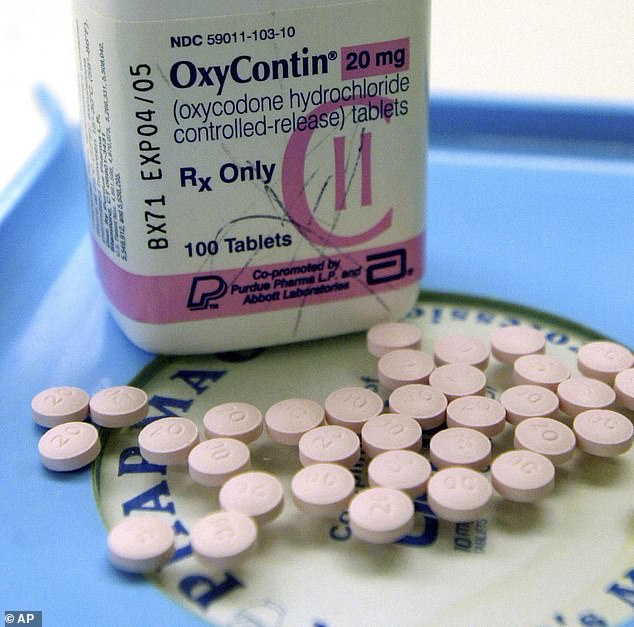NHS spending on addictive opioid painkillers has doubled since the pandemic, new analysis shows.
Doctors have handed out almost £1bn worth of drugs over five years, with experts blaming agonizing waits for surgery.
The health service distributed £90.1 million worth of medicines in 2019, a figure which rose to £186.2 million last year and a projected figure of £189 million this year.
This means spending is on track to hit £1bn by early next year, according to figures compiled by Oxford University’s OpenPrescribing.net.
It comes as waiting lists for routine NHS care such as hip and knee replacements continue to rise, reaching 7.64 million at the end of August.
NHS spending on addictive opioid painkillers has doubled since pandemic, new analysis shows
The Royal College of Surgeons has warned that hundreds of thousands of patients “continue to live in pain on waiting lists”.
Many rely on powerful drugs to survive, leaving them at risk of developing an addiction that continues even after surgery.
A recent study showed that longer wait times caused by Covid lockdowns led to a 40 percent increase in prescriptions for highly addictive opioids.
One in three people who take prescription painkillers also show signs of addiction, according to recent research from the University of Bristol.
The Emmy Award-winning television show Dopesick received critical acclaim last year for its exploration of the opioid crisis in the United States.
It told the story of OxyContin, a painkiller containing codeine that caused massive addiction and hundreds of thousands of deaths in the United States.
Opioids, including codeine, morphine, oxycodone, and tramadol, can provide very effective pain relief when used short-term.
But patients waiting months for an NHS operation are taking painkillers for dangerously long periods and finding themselves hooked.

The television show Dopesick told the story of OxyContin, a painkiller containing codeine that caused massive addiction and hundreds of thousands of deaths in the United States.
Professor Patrice Forget, who leads opioid research at the University of Aberdeen, said: “We need to review the way they are prescribed, better helping people when they are in pain, but not expanding prescriptions because that doesn’t work.”
‘We need to reinvent the way we support people.
‘It is not ridiculous after surgery to use opioids such as tramadol, carefully for one purpose – for example, walking the dog – for a short period of time.
‘But it’s not good for a long period of time while waiting for surgery or after surgery.
‘After the pandemic, opioid use will increase by 5 to 10 percent a year.
‘Over the last two or three years that figure clearly continues to increase.
‘It is very significant and we cannot say that this problem is contained or mitigated. “It’s clear that it continues to increase.”
Alan Duggan, 59, from Glasgow, married with two children, started taking opioids while facing a four-year delay for a much-needed hip replacement.
He said: ‘Hip pain affected every aspect of my life, I couldn’t work full hours, I couldn’t sleep well and I had to give up golf.
‘I had several falls because my balance was affected and I walked with a severe limp.
‘At first I took paracetamol for the pain, then cocodamol, tried dihydrocodeine and coproxamol.
“Finally, I started on tramadol and supplemented it with naproxen and amitriptyline.”
In the end he opted for the £7,800 hip operation at a clinic in Kaunas, Lithuania, and within two weeks the pain was completely gone, but he was still addicted to tramadol.
He said: ‘Giving up tramadol was difficult. I had to see my GP for help and it took me about three months to reduce the dose, lowering it by 50mg less per week.
“I’m fine now, but I’m incredibly cautious about taking strong painkillers.”
Anne, 60, from Norwich, started taking painkillers after an accident in 2016.
She said: ‘On the advice of my GP I started taking tramadol. It left me a little confused, but it made the job bearable.
‘They repeated the recipe and there was no advice or mention that it would be difficult to stop.
‘I had no idea I had become addicted. I couldn’t sleep and at one point I went 36 hours without a nap.
‘Withdrawal left me shaking and with a strange crackling in my brain. I was suffering from severe anxiety, I was nervous, and my brain was spinning in strange loops of thoughts.
‘In the end I had to go to my GP and he reduced the dose gradually, but it took six or seven weeks.
“It’s an incredibly dangerous drug and withdrawing it was a very unpleasant feeling.”
Dr Sarunas Tarasevicius, a surgeon at the Nordorthopedic Clinic in Lithuania, which has proven popular with British health tourists, said: “As waiting lists remain high for medical procedures in the UK, many patients experience pain. and atrophy, and some are taking dangerous steps. and addictive pain relievers.
“When the waiting time for surgery becomes very long, the use of painkillers, especially opioids, is also prolonged, which affects the psychological state of patients, due to the developed addiction.”

